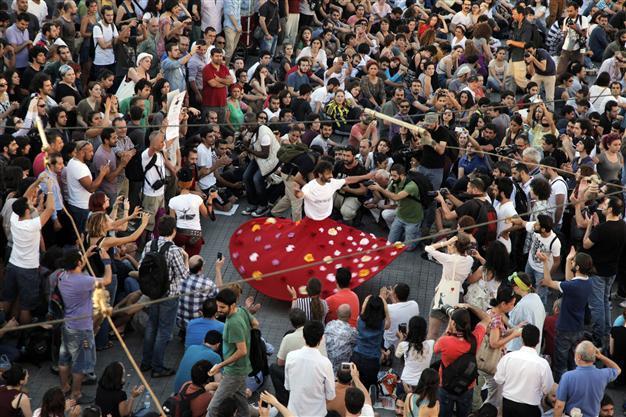US House committee scrutinizes the 'surprising and disappointing' response to Turkish protests
WASHINGTON

A street artist performs on Taksim Square during a protest in Istanbul on June 25. That demonstration was organized to protest the release pending trial of a police officer who shot a demonstrator in Ankara. AFP photo
A subcommittee of the U.S. House Committee on Foreign Affairs has held a hearing to assess the Turkish governments' “disappointing and surprising” response to the Gezi Park protests, in Washington June 26.
The hearing aimed to answer questions raised during the protest and assess its potential impact on U.S. interests, Republican Rep. Dana Rochrbacher, chairman of the Europe, Eurasia, and Emerging Threats subcommittee, said in opening remarks.
"This hearing is not intended to be a beat-up hearing on Turkey," he said.
Democratic Rep. William Keating said he personally would not have expected such a response from the Turkish authorities. "Following years of mostly astute governance in Turkey, the Turkish government's response to the recent protests came not only as a disappointment but also as a surprise," he said in an opening statement.
"The rhetoric of the Turkish government has inflamed the situation, as the prime minister publicly praises the police and repeatedly distinguishes between those that support him and those that do not," he added.
The committee also listened to the opinions of five specialists on Turkey: James Jeffrey, former Turkey ambassador and Washington Institute for Near East Policy fellow; Soner Çağaptay, director of the Turkish Research Program at the Washington Institute for Near East Policy; Kadir Üstün, research director of the SETA Foundation's Washington bureau; Hillel Fradkin, the director of Center on Islam, Democracy and the Future of the Muslim World at the Hudson Institute; and Kadri Gürsel, columnist at daily Milliyet.
All the contributors agreed that the ruling Justice and Democracy Party (AKP) needed to engage the protesters. Jeffrey emphasized that the United States administration should counsel the Turkish governments "behind closed doors," particularly regarding the long-term impacts of protests. "Publicly condemning Turkey and Prime Minister [Recep Tayyip] Erdoğan would be strongly counter-productive. It will not push the Turkish government to tailor its response," Jeffrey said.
For their part, Democratic Representatives Gregory Meeks and Gerry Connolly both said the United States had also passed through years of turbulence, especially in the sixties.
"We have to encourage the government of Turkey. The early steps and reforms of the government should not be forgotten," Meeks said.
Both the U.S. State Department and the White House had several times publically criticized the Turkish government's stance regarding the Gezi Park protests. Erdoğan had reportedly held a phone conversation two days ago with the U.S. President Barack Obama. Obama had insisted on the importance of nonviolence, the rights to free expression and assembly and a free press, a White House statement had said.
